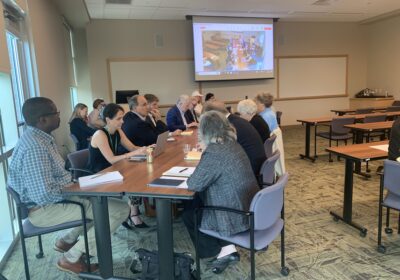Class modality preference varies among students

Students have experienced multiple class modalities, such as in-person, online and hybrid learning, over the course of the pandemic, but some students found that certain modalities fit their learning style more effectively than others.
Although the option to take classes online was available before the pandemic, COVID-19 forced the university to offer many of its classes remotely in 2020 and 2021.
The spring semester offered 1,007 online courses, an increase from the 989 in fall. However, the number of in-person classes saw a decrease from 3,346 in fall to 3,159 in spring.
While some students have enjoyed remote learning, others believe traditional, in-person education to be more effective.
English major Zachary Hernandez said taking in-person classes is more productive for him as he can better concentrate when the material is being taught.
“I feel like this [in-person] method of learning benefits me the most by allowing me to engage more in my classes,” he said. “Being able to ask questions and interact with my teachers really allows me to grasp the topics and teachings better.”
Online classes presented challenges for students who found it more difficult to concentrate on an online platform, such as biomedical sciences major Amanda Perez.
The traditional, face-to-face classroom setting allows for a distraction-free environment, something Perez said was difficult to have when doing classes online in her dorm.
“During the fall semester, I was enrolled in a class that had to go online for a few weeks,” Perez said. “Although I found the class interesting, I found it difficult to concentrate during these weeks, especially since my roommate was also in our dorm at the same time.”
Hernandez had a similar experience while studying online, and also pointed out that things got better while he was taking in-person classes.
“I am usually someone who falls behind a lot, and this was very apparent since moving to the online [environment],” he said. “However, being able to be in person this [fall] semester allowed me to have zero late work and receive straight As.”
Beyond the educational advantages of learning in an in-person environment, some students find that face-to-face classes provide them with social opportunities that can lead to strong friendships.
Perez said attending classes face-to-face has allowed for more opportunities to socialize and form acquaintances with peers whom she has been able to study with.
“Sometimes, during in-person classes, I’ll make a friend and study with them later on in the semester,” Perez said. “This helps me do better on exams while also socializing with people who are in the same classes.”
In-person learning methods also allowed language-speech-hearing sciences major Vanessa Torres to make new friendships while in class.
“During the fall semester, I met a classmate that I’m still in contact with and will continue to study together with,” she said. “I couldn’t have done that if I was learning remotely.”
Though some students found face-to-face learning to be more beneficial to their educational and social lives, others found that the hybrid option of classes allowed them to make their own decisions about their schedules.
The number of hybrid classes offered in spring saw a slight decrease from fall. There were 230 hybrid options for spring, while fall had 234.
Hybrid and online learning methods are something communications major Julia Gaziano said helped to benefit her personal life.
“I like the option of online classes because I can tailor it to my schedule,” Gaziano said. “I like to work and make money, so I am able to do that when doing online classes. However, when I do in-person classes, I have to limit my hours.”
For criminology major Maria Ramirez, a hybrid learning method is more beneficial as it allows her to meet new people and learn from home when she can’t attend class in person.
“Hybrid classes benefit me the most because it allows me to attend class even if I’m feeling sick and cannot make it to the class physically,” she said. “[Hybrid learning] allows me to have the option of sometimes going in person and meeting new people as well as staying at home and attending class online and not missing any lectures.”
Some students found that having the option to attend classes online has helped with their time management skills.
Maria Lopez, a political science major, said she prefers hybrid classes because online learning gives her additional time that would have been spent going to class, while in-person classes keep her accountable and productive.
“In the past, in high school, I have taken a hybrid approach to my classes,” she said. “It has given me more time to get my schoolwork done and also maintain a healthy social life.”
While there is currently a push from the university to return to in-person classes, Hernandez said he believes students should have the choice to pick whichever modality fits them the best.
“I think the school should have more online classes, so students who work better in this format can have the same opportunities as the other kids,” Hernandez said.






